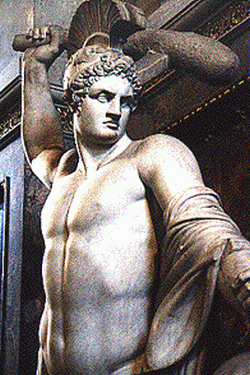Juvenal (Iuvenalis) has most certainly gained along the centuries the fame of being one the most sarcastic and caustic writer of all times. He is definitely disgusted and irritated by the diffused decadence of Rome during the Flavian ruling dynasty (69-96 A.D.). Juvenal is annoyed by the vices that characterised those years, and that to a certain extent can be considered as originated more by human nature rather than by the unbridled dissolution of that peculiar depraved society.

Juvenal spares nobody in his 16 satires: nobles, merchants, women, homosexuals, intellectuals or supposed so…, the mob itself, and above all those gold diggers who would do anything to climb within the Empire bureaucracy and get any parasite assignments, are victims of his disdain and invectives.
Strong words of condemnation against the effeminate and dissolute behaviours, a shame or even a sin compared to the glorious and irreproachable past; conducts that keep contaminating the Roman republican spirit:
Quid prodest…effigies quo
tot bellatorum, si luditur alea pernox
ante Numantinos, si dormire incipis ortu
luciferi, quo signa duces et castra mouebant?
cur Allobrogicis et magna gaudeat ara
natus in Herculeo Fabius lare, si cupidus, si
uanus et Euganea quantumuis mollior agna,
si tenerum attritus Catinensi pumice lumbum
squalentis traducit auos emptorque ueneni
frangenda miseram funestat imagine gentem?
Thus his compositions contain a kaleidoscopic harvest of chronicle on early Imperial Rome, and strike hard even its political fundaments, as for example against Emperor Claudius’ wife, the famous Messalina who reportedly used to leave at night the imperial palace under disguise (apparently a blond wig and a bogus name “Lycisca” were not enough, though…) in order to linger in low profile brothels of Subura (the Red Light district of ancient Rome) offering her favours:
…respice riuales diuorum Claudius audi
quae tulerit. dormire uirum cum senserat uxor,
sumere nocturnos meretrix Augusta cucullos
ausa Palatino et tegetem praeferre cubili
linquebat comite ancilla non amplius una.
sed nigrum flauo crinem abscondente galero
intrauit calidum ueteri centone lupanar
et cellam uacuam atque suam; tunc nuda papillis
prostitit auratis titulum mentita Lyciscae
ostenditque tuum, generose Britannice, uentrem.
excepit blanda intrantis atque aera poposcit.
Thanks to his writings Juvenal is also the “father”of timeless expressions, which again confirm his wisdom and that human nature has not changed one bit since then. As when he suggested that the best political instrument for a monarch to gain consensus and stability is keeping the mob by his side with very simple remedies like bread and circus:
…nam qui dabat olim
imperium, fasces, legiones, omnia, nunc se
continet atque duas tantum res anxius optat,
panem et circenses.
Furthermore when it comes to laws and rules he wonders about the accountability of those who are supposed to enforce it:
audio quid ueteres olim moneatis amici,
‘pone seram, cohibe.’ sed quis custodiet ipsos
custodes? cauta est et ab illis incipit uxor.
Juvenal himself must have recognised he had no chance to live according to these scornful unacceptable rules and consequently to achieve any higher position. He was aware to be unable or unwilling to compete with this incredible amount of shallow people, praising and begging their patrons within their sycophantic role of clientes in order to obtain some little power or just an easier life. Juvenal most definitely must have felt left out of this profligate society, being a rather not very successful lawyer, still linked to those values of honesty and hard work emblematic of his countryside background and criticises and scorns the new metropolitan fever for easy life and uncontrolled consumes. Yet he strives in showing a different, steadier and genuine life style, but remains unheard:
orandum est ut sit mens sana in corpore sano
His discouragement is palpable as he himself admits that someone with his character, beliefs and principles may be easily considered in his days both silly and anachronistic, and his disposition and views would not gain any favour or esteem among the metropolitan “clientes based” and corrupted Rome:
Probitas laudatur et alget
I guess people of such moral and intellectual stature are normally destined to be alone as the may become a very uncomfortable example for those who can instead live without so many scruples.




